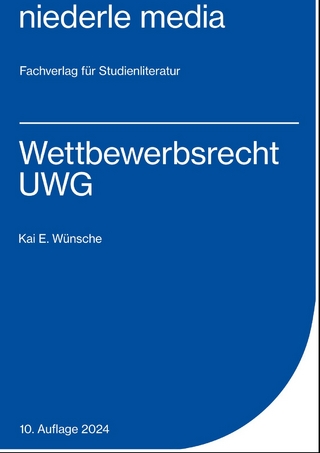
Handbook on the Antitrust Aspects of Standards Setting
Seiten
2005
American Bar Association (Verlag)
978-1-59031-412-8 (ISBN)
American Bar Association (Verlag)
978-1-59031-412-8 (ISBN)
- Titel ist leider vergriffen;
keine Neuauflage - Artikel merken
Explores the antitrust constraints on standards setting and enforcement. This book addresses how the antitrust laws balance the pro-competive effects of standards.
Standards play an increasingly critical role in our economy. This book addresses how the antitrust laws balance the procompetitive effects of standards -- promoting innovation and efficiency, facilitating entry, and ensuring interoperability -- against the potential misuse of standards (and the standard-setting process) to create barriers to entry, retard innovation, raise rivals' costs, facilitate collusion, and protect market position. The Handbook covers a broad spectrum of standards, including (a) quality standards, (b) informational standards, (c) uniformity standards, (d) interoperability standards, and (e) non-product standards, such as professional conduct standards. This book reviews both cooperative standard setting and unilateral conduct relating to standards. It contains an up-to-date discussion of important recent decisions in the standard-setting area, including the Federal Trade Commission's July 2004 decision to reinstate an antitrust complaint against Unocal for allegedly manipulating the process by which a standard for low emission gasoline was set.
The Handbook explores antitrust issues raised by standard-setting activities, such as; applicability of the per se rule or the Rule of Reason; how standards are set and maintained by single firms; the competitive issues that can and do arise from efforts to influence or control standards (e.g., refusals to deal, enforcement of invalid intellectual property rights, "leveraging" control of standards to monopolize another product market, and compelling access to proprietary standards); immunities applicable to standards setting and; remedies (both damages and equitable remedies) that are available to redress the effects of standards-related activity found to be unlawful. Handbook on the Antitrust Aspects of Standards Setting provides a single source for understanding this evolving area of the law, making the antitrust analysis of standards setting more understandable and more accessible to participants and their counsel.
Standards play an increasingly critical role in our economy. This book addresses how the antitrust laws balance the procompetitive effects of standards -- promoting innovation and efficiency, facilitating entry, and ensuring interoperability -- against the potential misuse of standards (and the standard-setting process) to create barriers to entry, retard innovation, raise rivals' costs, facilitate collusion, and protect market position. The Handbook covers a broad spectrum of standards, including (a) quality standards, (b) informational standards, (c) uniformity standards, (d) interoperability standards, and (e) non-product standards, such as professional conduct standards. This book reviews both cooperative standard setting and unilateral conduct relating to standards. It contains an up-to-date discussion of important recent decisions in the standard-setting area, including the Federal Trade Commission's July 2004 decision to reinstate an antitrust complaint against Unocal for allegedly manipulating the process by which a standard for low emission gasoline was set.
The Handbook explores antitrust issues raised by standard-setting activities, such as; applicability of the per se rule or the Rule of Reason; how standards are set and maintained by single firms; the competitive issues that can and do arise from efforts to influence or control standards (e.g., refusals to deal, enforcement of invalid intellectual property rights, "leveraging" control of standards to monopolize another product market, and compelling access to proprietary standards); immunities applicable to standards setting and; remedies (both damages and equitable remedies) that are available to redress the effects of standards-related activity found to be unlawful. Handbook on the Antitrust Aspects of Standards Setting provides a single source for understanding this evolving area of the law, making the antitrust analysis of standards setting more understandable and more accessible to participants and their counsel.
| Erscheint lt. Verlag | 25.6.2005 |
|---|---|
| Verlagsort | Chicago, IL |
| Sprache | englisch |
| Maße | 155 x 227 mm |
| Gewicht | 276 g |
| Themenwelt | Recht / Steuern ► EU / Internationales Recht |
| Recht / Steuern ► Wirtschaftsrecht ► Wettbewerbsrecht | |
| ISBN-10 | 1-59031-412-3 / 1590314123 |
| ISBN-13 | 978-1-59031-412-8 / 9781590314128 |
| Zustand | Neuware |
| Haben Sie eine Frage zum Produkt? |
Mehr entdecken
aus dem Bereich
aus dem Bereich
mit Preisangabenverordnung
Buch | Hardcover (2023)
C.H.Beck (Verlag)
139,00 €


